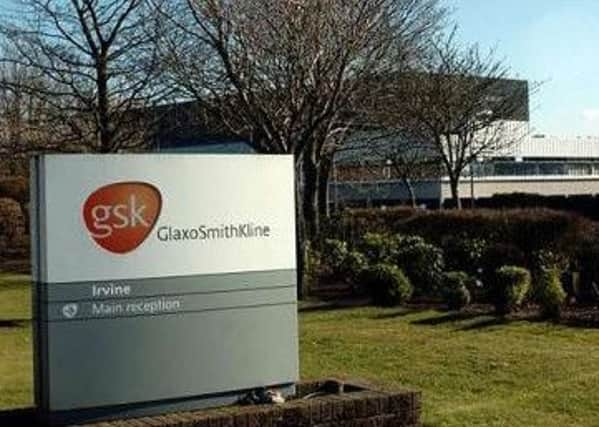Irvine’s key role in life sciences initiative


The strategy and investment behind the move – that will see research translated into high quality manufacturing jobs – is coming together like an enormous jigsaw, according to Alastair Leighton, site director with global healthcare firm GlaxoSmithKline’s Irvine plant.
He said: “The pieces are all there, and they are increasingly being fitted together to create a picture of optimism and potential for the future of what is a high priority sector for the Scottish and UK governments.
Advertisement
Hide AdAdvertisement
Hide Ad“South west Scotland – and the i3 Enterprise Area at Irvine in particular – has a key part to play, offering access to a skilled and experienced workforce and the necessary infrastructure and connectivity to make it the ideal location for life sciences manufacturing businesses, such as the one being run by GSK.”
GSK is well established in Irvine. Ground was broken on building the facility in the early 1970s, and it began manufacturing in 1973, at that time involved in the manufacturing process of penicillin.
Mr Leighton said the Irvine site now produces an important and well established penicillin based antibiotic product which is supplied to more than 140 countries around the world.
He added that while the established markets, including Europe and the US, remain important, the main driver of growth for these drugs is in the emerging markets, where a new generation of patients are now able to access these life saving medications.
As medical manufacturing in the UK is highly regulated, patients and medical professionals around the world are said to have confidence in the drugs and consumer healthcare products which are made here.
Close to GSK’s Irvine site, land is currently available within the Enterprise zone for companies wishing to establish a strong base in this region of Scotland.
Where appropriate, the existing resources and infrastructure, such as the waste treatment plant, could be shared. The establishment of more businesses involved in life sciences or manufacturing for the site supply chain would be especially welcome.
The research being done at the world-class universities across Scotland needs to continue to be translated into growth in employment opportunities and real, boots-on-the-ground jobs. Investing in opportunities, such as those provided in the Enterprise Areas, helps retain this scientific knowledge and capability in Scotland. GSK is extremely supportive of the work being done by Scottish Enterprise and the Scottish Government in this area.
Advertisement
Hide AdAdvertisement
Hide AdAcross the business, GSK has a number of partnerships helping to further scientific research and understanding. The site at Irvine works closely with the University of Strathclyde through their innovation centre’s ‘Continuous Manufacturing and Crystallisation’ and the Industrial Biotechnology Innovation Centre (IBioIC), which involves 14 Universities and industrial partners.
GSK has invested around £100 million at its Irvine plant since 2012, with some of this investment focused on increasing capacity and to enable the site to partially run on renewable energy. Being carbon neutral is a major part of the site’s future manufacturing strategy, providing both environmental and economic benefits, and the site is already generating 10% of the power it needs through wind.
The company has also invested in a biogas plant. The biogas plant powers the waste water system at the site– at a scale equivalent to one used to service a city the size of Dundee. What is remarkable is that waste materials from the site are used to produce gas that in turn powers the waste water system.
Alastair Leighton said: “In Scotland, it is important to continue to work together to do the right things – to ensure we link industry and research and academic institutions, to ensure that we are being innovative in our approach to manufacturing and developing the skilled people we need.
“We need to translate our research skills into manufacturing jobs, and we need to continue to invest to ensure we have the sustainable infrastructure and supply chain in place to support the brilliant, innovative science and manufacturing happening across Scotland.”